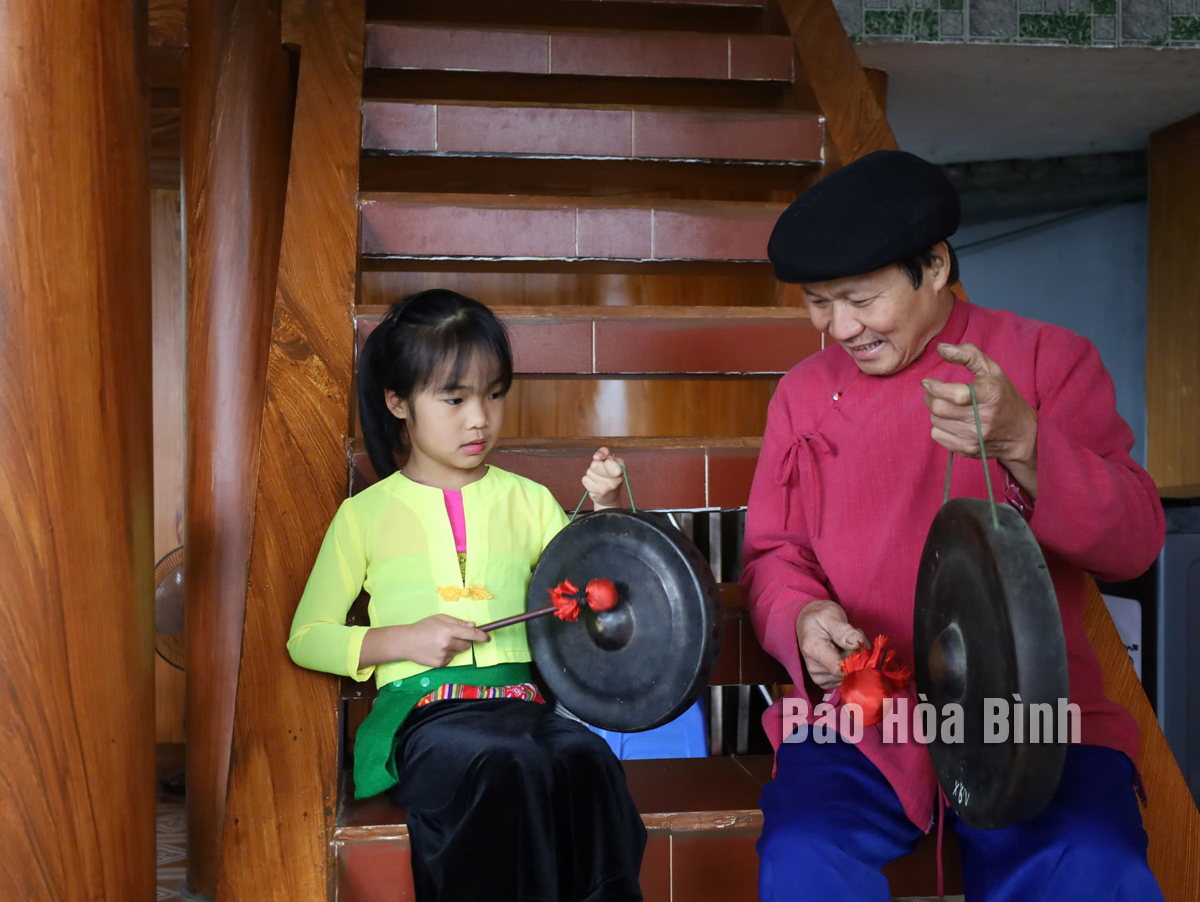
Gongs hold a special place in the cultural and spiritual life of the Muong ethnic people in Hoa Binh province. More than musical instruments, they are an indispensable part of community rituals and collective memory, echoing through generations as a spiritual thread linking the past, present, and future.

Dedicated
artisans like meritorious artist Bui Tien Xo from Vinh Tien commune (Kim Boi
district) pass on their passion for Muong cultural heritage to younger
generations.
For centuries, the sound of gongs has accompanied important
Muong ceremonies including new year blessings, weddings, funerals, traditional
communal hunts, house-building, and inaugurations. The rhythms of the gongs
help shape the atmosphere like festive, solemn, joyful, or mournful and serve
as a communication tool to announce urgent events like natural disasters or
family mourning.
Gongs are also used to inspire unity and morale, and once
symbolised authority and power, especially in the hands of local chieftains.
Played in structured patterns, Muong gongs produce unique, resonant melodies
that stir deep emotions.
To the Muong people, gongs are sacred family heirlooms, passed
down through generations. According to local authorities, there are over 11,000
gongs across the province, concentrated in the four major Muong regions,
including Bi (Tan Lac), Vang (Lac Son), Thang (Cao Phong), and Dong (Kim Boi)
and other districts like Luong Son, Da Bac, and Hoa Binh city.
In recent years, the province has taken steps to preserve and
promote gong culture. Numerous gong clubs have been established, and passionate
individuals such as Bui Ngoc Thuan (Cao Phong), Bui Huy Vong (Lac Son), and
others have devoted themselves to researching, teaching, and reviving
traditional gong practices for younger generations.
Muong gong culture remains vibrant, featured in major festivals
such as the Khai Ha festival, fish-catching rituals, new year blessings,
weddings, harvest celebrations, military conscription days, and national unity
days. Iconic gong piecessuch as "Welcoming Guests,” "On the Road,” and "White
and Yellow Flowers”, are being embraced by youth. Researchers have now recorded
50 traditional gong melodies.
Hoa Binh’s gongs have also gained national and international
recognition. A 1,500-performer gong ensemble at the province’s 125th
anniversary in 2011 set a Vietnamese Guinness record. In 2016, 2,000 artisans
performed in another record-setting event. Most recently, at the 2022 "Hoa Binh
– Sounds of Muong” carnival, over 200 performers showcased this living
tradition.
Recognised
as a National Intangible Cultural Heritage, Muong gongs are not only a proud
cultural symbol of Hoa Binh but also a valuable tourism asset, contributing to
the province’s socioeconomic development and cultural identity.
With an increasingly vibrant and widespread emulation movement aimed at building cultured residential areas and cultured families, Yen Thuy District has been making steady progress toward improving both the material and spiritual well-being of its people, while fostering a civilized, prosperous, beautiful, and progressive community.
Once lacking recreational spaces and community facilities, Residential Group 2 in Quynh Lam Ward (Hoa Binh City) has recently received attention for the construction of a new, spacious, and fully equipped cultural house. The project followed the model of state support combined with public contributions in both labor and funding.
The "All people unite to build cultural life" movement, which has been effectively integrated with Kim Boi district’s socio-economic development goals, is fostering a lively spirit of emulation across local residential areas, hamlets, villages, public agencies, and enterprises. In addition, through the initiative, traditional cultural values are being preserved and promoted, while community solidarity and mutual support in poverty reduction and economic development are being strengthened.
A working delegation of the Hoa Binh provincial People’s Committee led by its Permanent Vice Chairman Nguyen Van Toan on June 11 inspected the progress of a project to build the Mo Muong Cultural Heritage Conservation Space linked to tourism services in Hop Phong commune, Cao Phong district.
Born and growing in the heroic land of Muong Dong, Dinh Thi Kieu Dung, a resident in Bo town of Kim Boi district, in her childhood was nurtured by the sweet lullabies of her grandmother and mother. These melodies deeply imprinted on her soul, becoming an inseparable part of her love for her ethnic group's culture. For over 20 years, this love for her hometown has driven Dung to research, collect, and pass down the cultural values of the Muong people to future generations.
In the final days of May, the Ethnic Art Troupe of Hoa Binh Province organized performances to serve the people in remote, mountainous, and particularly disadvantaged areas within the province. These were not just ordinary artistic shows, but they were the meaningful journeys aimed at spreading cultural values, enhancing the spiritual life of the people and contributing to the preservation of ethnic minority cultural identities.



